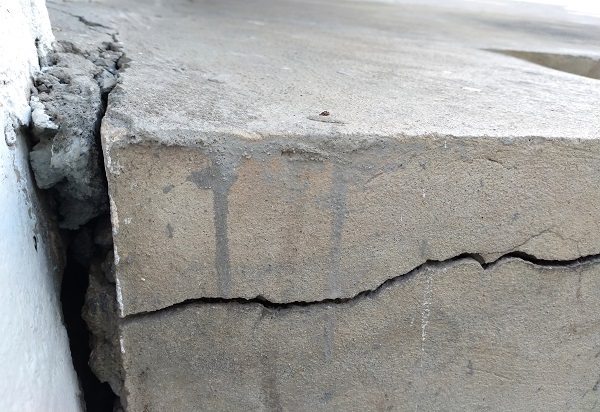Your home’s foundation could be failing, and you might not even be aware that you have a foundation problem. When you have damage to your foundation, there’s nothing below it to help hold your house up. As a result, the damaged foundation can cause parts of your home to sink into the ground as the weight of the house continues to settle. This can result in further structural damage to the rest of the house to the point that the house begins to literally tear itself apart. This can be seen through cracks that run the length of your walls, doors, and windows no longer opening and closing smoothly, parts of your floor sinking or rising, damage from water, pests that are able to find new points of entry or debris that’s able to blow in and build up. If you notice any of the four major signs of foundation problems, you may have a damaged foundation that should be fixed as soon as possible.
Cracks in the Walls
Finding cracks in and around your house can sometimes be a sign of age, the presence of or lack of humidity affecting your walls, or simple accidents that might happen just from living there. However, there are other times cracks can be a sign that your house is losing structural integrity thanks to the foundation. As your house settles and the foundation fails, it can mean there’s nothing to support the house itself and how it’s built. This can result in the house beginning to pull itself apart as it bends or moves to better settle in the ground. The cracks that result from this can be seen both inside and along the exterior of your house. The cracks can also range in size, from hairline-sized cracks that are barely noticeable to much larger ones. In fact, the larger ones are a more sure sign of structural damage and are when you should really start getting concerned.
Problems Opening and Closing Doors and Windows
If the doors and windows in your home have become more difficult to open and close without a reasonable cause, your foundation should be investigated for problems. A damaged foundation could put pressure on your walls as your home starts to sink, and this can create challenges with opening and closing doors and windows. With the proper building foundation repair work, you’ll be able to maneuver your doors and windows with greater ease.
Uneven Floors
An uneven floor is a catch-all term often used to describe when a floor bounces, buckles, sags, or slopes. All things that a floor should not do. In fact, it’s very common to find a house with more uneven floors the older the house is thanks to both a shift in the foundation and the house itself settling over time. That being said, uneven or even mainly sagging floors are another area where the cause could be different things. Sometimes your floors sag because of rot thanks to water damage, the wood of your home being eaten by termites, or even just simple wear and tear as it gets old.
However, it could also be a result of the house settling as your foundation fails. You might notice that your floors have become uneven with areas in your house either bowing or sagging when you walk across them. If this issue is occurring more and more, a damaged foundation could be impacting your home’s beam and pier foundations and causing unevenness in your floors. Uneven floors also have a tendency to squeak and groan more when they’ve been walked across, so you should listen for sounds that could indicate foundation damage.
Water Damage
Water damage in your home or anywhere else on your property can easily be linked to a problematic foundation. A damaged foundation has the ability to put extra pressure on areas of your house like your pipes, which in turn can eventually cause them to burst. Then, the resulting gush of water from the pipes will then in turn damage the foundation, even more, causing a sort of feedback loop. You might even notice further water damage to your home if your home has started to sink into wet soil thanks to a damaged foundation and the water leaking into the dirt your house is sitting on.
The foundation of your home is one of the most essential components of your home, simply by virtue of being what the rest of your house sits on and settles on. When your foundation fails, there’s not much left preventing your house from submitting to the shifting ground beneath it. No matter what type of soil your house sits on, this means your house will eventually be in danger of collapse. Any foundation damage that you discover should be taken very seriously and treated as quickly as possible. After all, the sooner you can put your house on a more stable foundation, the less time it has to be literally pulled apart. By keeping these telltale signs of foundation damage in mind, such as taking note of the cracks in your walls, monitoring your doors and windows, noticing when your floor begins to sag, and keeping an eye out for water damage, you’ll likely be able to spot any damage quicker and as a result, take swifter action in order to resolve the issue. This will largely entail getting in contact with a professional that can handle the problem in a quick and efficient manner.

